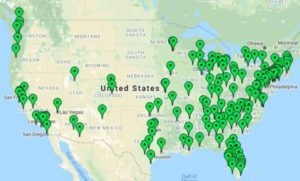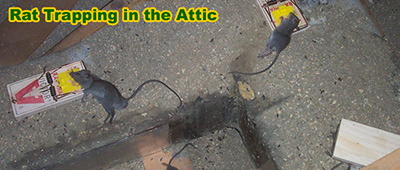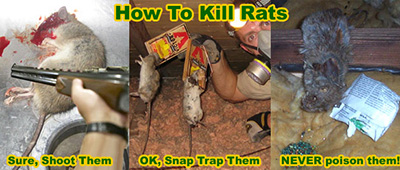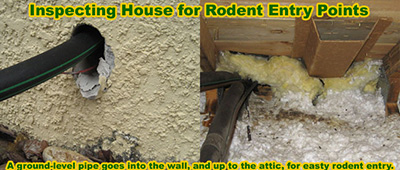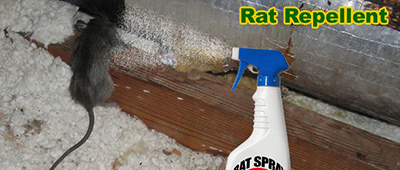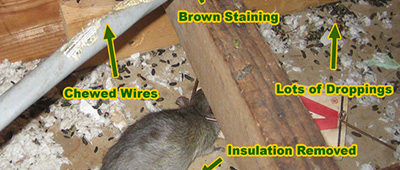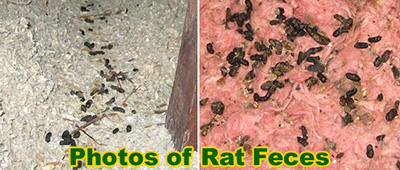The first thing you should do about rats in a rental property is get in touch with the landlord,
or agency that is working on behalf of your landlord, and let them know about your concerns. Have
you physically seen rats yourself? Or have you noticed evidence that rats are present - rat feces,
for example, or signs of chewing and gnawing? You should note down the things that you have spotted
and also the things that you have heard. In the middle of the night, these rats are more active.
They are nocturnal. If you get woken up by something unusual and you're not sure what it is, rats
could be the cause.
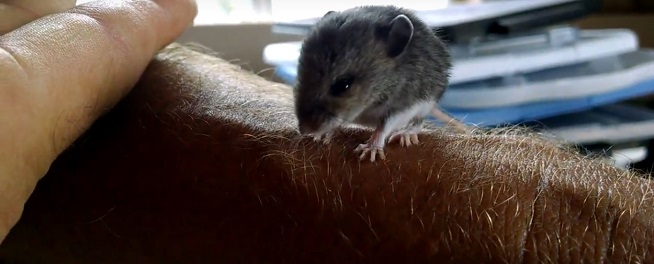
The more information you can give the agency or landlord, the better and faster that the problem can get resolved too. If the landlord is treating the problem his / herself, they'll know where to start. If they are hiring someone, they can tell the rat removal specialist where the problem seems to be the hardest hitting. The key here is communication - you will need to communicate with each other regularly to ensure you get rid of the rats, and then keep them out too.
If you don't know where the rats are coming from, you can use flour or other white powder to help you. If you spot rat feces in the kitchen, for example, but you can't work out how they are getting in and out of there, sprinkling flour around the floor, close to where the floor meets the walls, will give you a better idea of where they are running around the most. When you wake up the next morning and check the floor, you will see teeny-tiny paw prints. This will show you where they are the most active.
You can also use balls of scrunched-up paper and kitchen towel in holes. If this scrunched-up balls of paper are moved or bubbled in the morning, you know that particular hole is where the rats are hanging out. You can then take heavier measures - placing traps - knowing that you are placing them in the spots where they'll catch themes rats. It is generally down to the landlord to ensure the property is habitable and rat-free, but you may need to work together with the landlord to ensure the job gets done. It might be the landlords job to keep the home habitable, but it is your responsibility to take care of the property while you're giving there, and this will include cleaning up and keeping an eye on things to ensure these rats can't break in, in the first place.
Go back to the Rats in the Attic home page.
Who is Responsible for Rat Removal, Tenants or Landlords?
If you have moved into a property and found evidence of rats, the first thing you should do is report the problem to the landlord or landlady. If you have rented the property through an agency, you should make them aware of the problem. It is the homeowners responsibility to ensure the property is habitable, and it can be deemed uninhabitable very quickly once rats have found the way in. Rat urine and feces, for example, is very dangerous, particularly to pregnant or breastfeeding women, and also young children / the elderly too.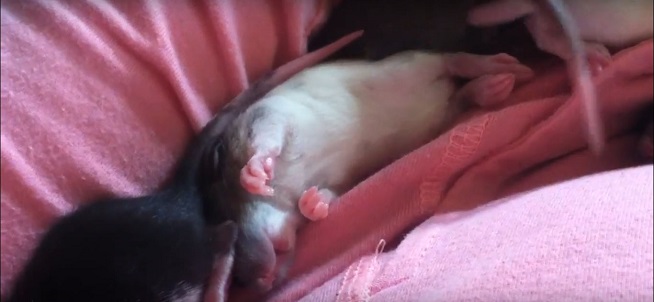
Although rat removal might be the responsibility of the property owner, it is the tenants responsibility to ensure the place is kept clean and tidy. If you regularly leave cat or dog food out, for example, you are just inviting animals into your property. Once they get close enough to check out the food you've left on the back porch, it won't be long before they're actually sniffing around your home. Not much longer after that, they'll be in, and then you and your landlord will have a very big problem on your hands.
It is your landlords responsibility to ensure the home is well maintained, but it is your responsibility to keep things clean (and therefore keep the rats and other wild animals at bay), and also report any problems that you do see as soon as possible. If you are in touch with both the landlord and the agency, we would always reporting the issue to both parties … just in case. Keeping rats out of your property is a responsibility that both landlords and tenants should bear the brunt of. The two will need to work together to keep an eye on the home, and to make sure that any problems are death with quickly and efficiently. Landlords should perform regular inspections of the property, particularly if there has already been a rat problem previously, and tenants should make sure they are keeping their eyes open for the biggest warning signs that rats have moved in. These will often include small holes, feces, urine, grease stains, chewed marks, and even noises heard in the middle of the night. Rats are nocturnal, much like the other critters that are likely to break into your home, and it will be during the night that you will more than likely hear them.
Work together with your landlord. If you think you have rats, buy rat traps. They cost just a few dollars, and the old fashioned, cheap and simple snap rat traps are the best option. Report a problem as soon as you see it, and work together to get rid of the problem. A landlord will not want rats in their building, particularly because of the damage they can cause, but a tenant will want rats in the building even less. These unhygienic critters can be very dangerous to the health of humans, and even household pets too.
Go back to the Rats in the Attic home page.
Is Rat Damage Covered by Renter's Insurance?
We would highly recommend that you get in touch with your insurance company to find out if rat damage is covered by your policy, but as a general rule, there is a clause that states rat damage WILL NOT be covered. There are a number of reasons for this …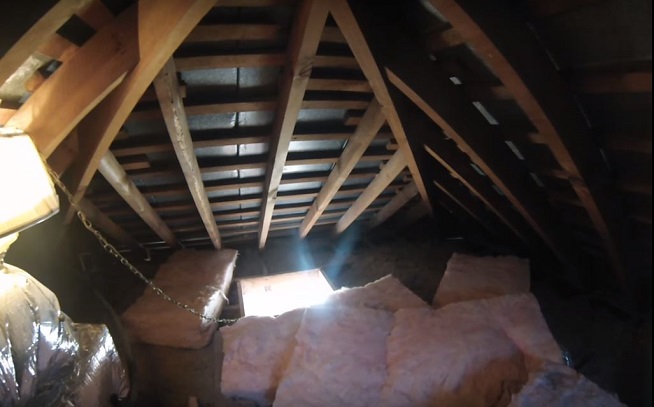
1
- The rat damage, if present before you moved in, is the landlord's responsibility. They should remove the rats, seal up the building so that the rats can't come back in, and also keep up to date with house inspections and maintenance to ensure the problem can't return.2
- If the rats have moved in after you have moved in, there's a good chance the invasion is caused by something you have done - not clearing up after yourself, for example. Also, it is your responsibility to take care of the property while you're renting it, and that includes reporting any spots of damage to the landlord in a timely fashion. If you are keeping up to date with looking after your own home, and the landlord deals with any damage or weak spots efficiently, the rats wouldn't have been able to get in, in the first place.3
- Renter's insurance will cover you for hidden damage, and rat damage isn't actually considered to be hidden damage. They don't hide and chew, they chew anywhere they feel like it, and rat infestations are actually easy to spot once they have started, particularly if both you and the landlord are keeping up to date with inspections and maintenance on the property.In short, you are NOT likely to be covered for rat damage in your renter's insurance, and we would highly recommend that you check before you start putting your hand in your pocket for any rat removal costs that your landlord should be paying.
4
- Is rat damage covered by renter's insurance?We have bad news for you, folks. If you are renting a property and hoping that your renter's insurance will cover you, not just for the removal of the rats, but also to cover the costs for the repairs that will need to take place, you're probably not going to be covered. And when we're talking about rats, those repairs can be extensive and costly. There are a number of reasons why you are not likely to be covered by your renter's insurance for rat damage and rat problems, but the biggest reason is because rats can be avoided. The reason rats invade a property is because they can. Patches of the home are usually neglected, and these spots become weak. Rats can sense this, and they'll work away at the area until they have finally chewed and gnawed their way through. They can do this through brick, drywall, wood, plastic, and plenty of other materials, making huge areas of your home vulnerable.
Rat damage is more extensive (and expensive) the longer it is left. If you and the landlord do what you are meant to do - keep an eye on the building, inspecting it regularly, and keeping up to date with maintenance - the rats wouldn't have gotten in. They wouldn't have caused that damage. In short, rats get in because the people living / owning the property are negligent with it. The insurance company ASSUME that the landlord and tenant will work together so that steps are taken to ensure a rat infestation doesn't happen. If the property has had the chance to be infested by rodents, and then damaged considerably, it is because those steps weren't taken. It would be like expecting your vehicle insurance to cover you even though you haven't performed the appropriate vehicle inspections.
Go back to the Rats in the Attic home page.
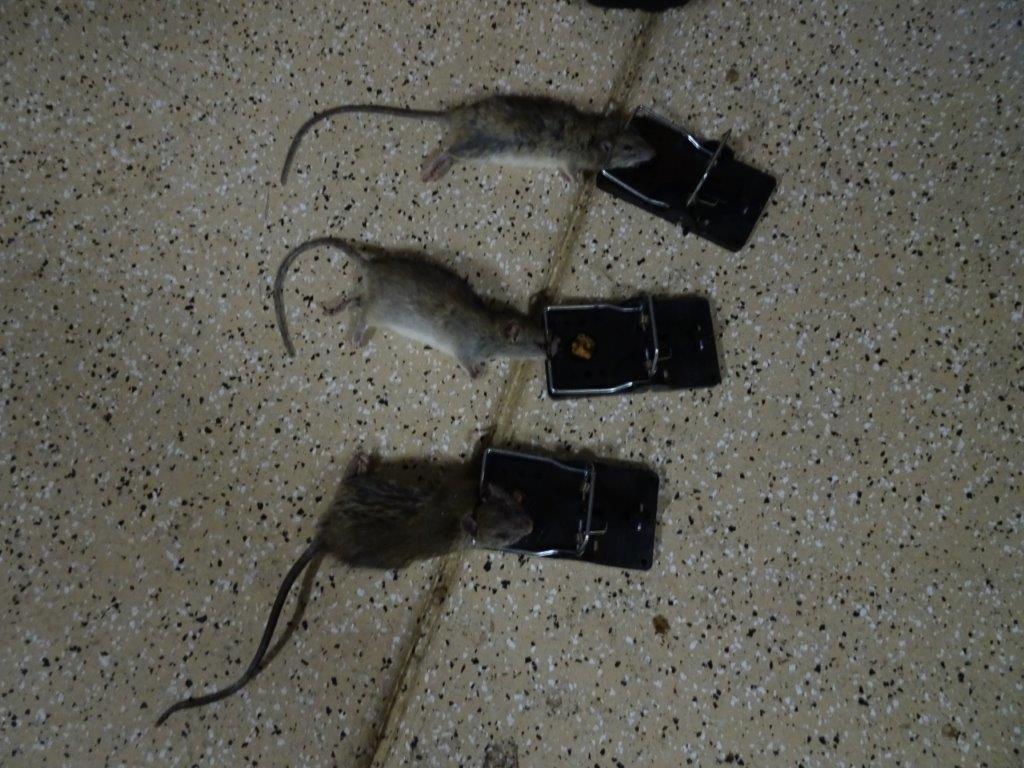
Short Term Fixes for Rats in Rental Properties
Moving in to a new rental property to find out that you have rats is never pleasant. If this happens to you, we would highly recommend that you get in touch with your landlord or rental agency as soon as possible. If the rat infestation is quite a large one, there is a good chance that you will need a rat removal expert, or even a company, to come out and do some work on the property. This will will include a thorough home inspection, hunting out patches around the home that rats are using to get in and out. These spots will need to be repaired, as well as a damage that the rats have caused within the home. Following that, rat traps will need to be set, and these will need to be regularly checked. You will often need multiple traps too. One or two won't do the job if the rat pack is a very large one, one that has been left to its own devices for a long time … This can often be the case with both residential and commercial properties, and particularly those that have been empty for a long time.
*Patches of damage - chewing, gnawing, busted eaves, soffits and fascias, or areas or crumbling on walls, particularly where the chimney meets the rest of the home.
*Rat feces
*Rat urine stains
*Rat fur grease stains (often left by rats continually running through and brushing up against the surface)
These are all signs that rats have invaded, and on top of these, you may even hear them. Gnawing and chewing sounds during the night are often heard by homeowners with rats in the building, and chirping and chattering noises can often signify a pack has moved in and they're all communicating with each other. Even a weird smell can alert you to the presence of an animal that shouldn't be there. You shouldn't ignore these signs.
If you have already moved into the property and are now faced with a rat problem, there are a few things that you can do to make life easier. As well as letting the landlord or rental agency know of the problem, you should make sure that you aren't leaving food around. Rats can chew through the cardboard boxes that contain breakfast cereal, for example, so try moving them to sealed plastic containers. Rats can chew through these too, but if they are sealed and the rats can't smell the food, they are less likely to have a reason to chew through the plastic. You should also ensure you aren't leaving garbage lying around, and the same goes for pet food too. In short, if you clean up after yourself properly, rats won't find food that will encourage them to then set up a permanent residence in your home.
If you can buy rats traps, set a few. Peanut butter makes for a great bait, and if you keep them close to the walls, and close to the areas you think the rats are moving around the most, it won't be long before you start catching them. Just make sure you're wearing thick rubber gloves. You don't want to put yourself in the direct line of disease. Paper or kitchen towel can be used to stuff holes. The rats can chew through it, but then you'll have a good idea of where the rodents are running around, and also what holes they tend to be using the most. Flour can also be sprinkled on the floor. Again, this won't get rid of the rats, but at least then you'll know where they are congregating the most.
The only way to get rid of rats is to seal the home, trap the rats caught up within it, and then make sure that regular home maintenance is kept up with. There are no short term fixes for rats in rental properties, but these will at least give you a head start in fighting back while you wait for your landlord to get back in touch!
Go back to the Rats in the Attic home page.

